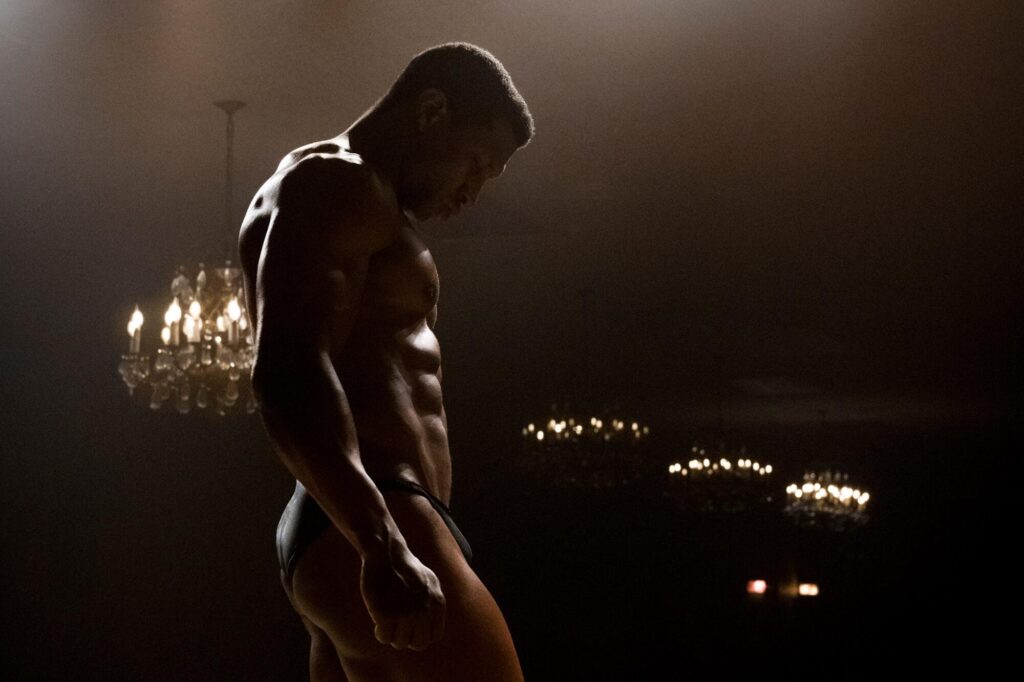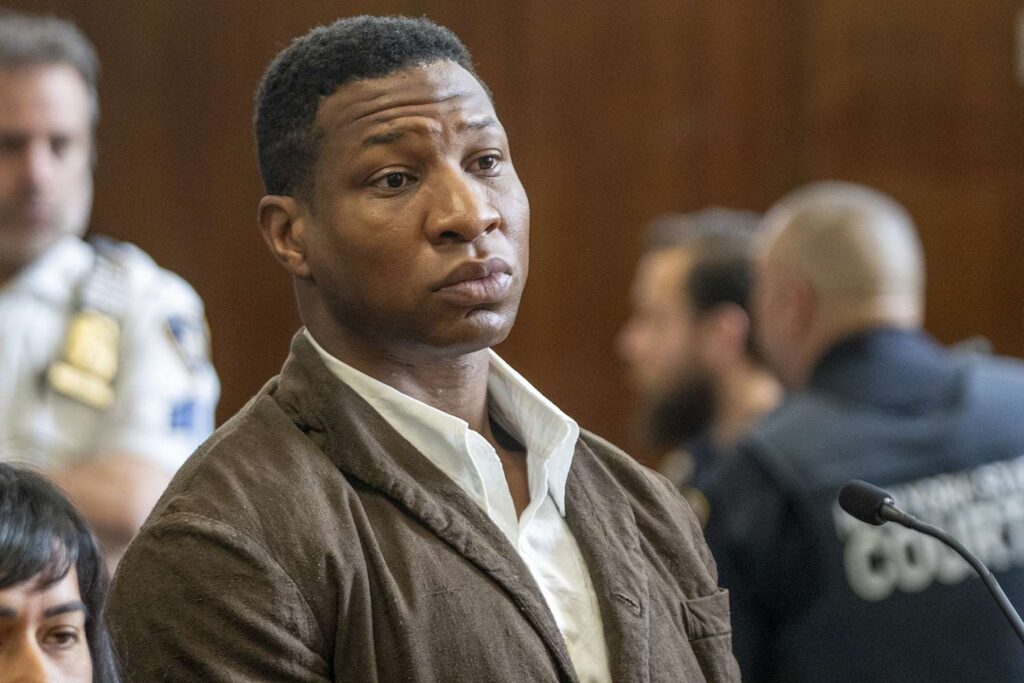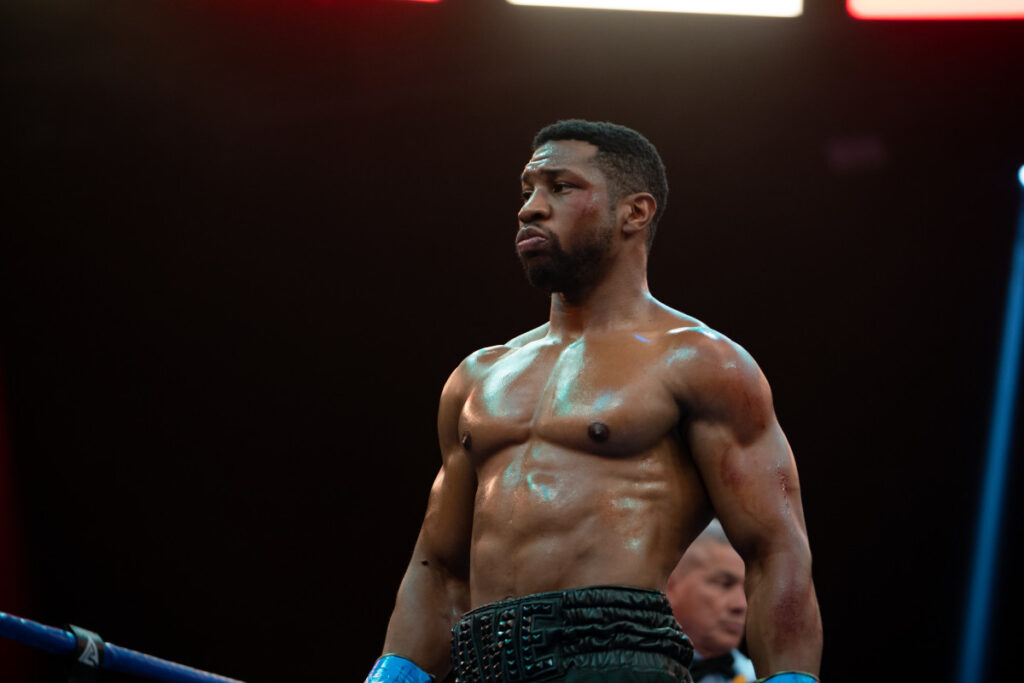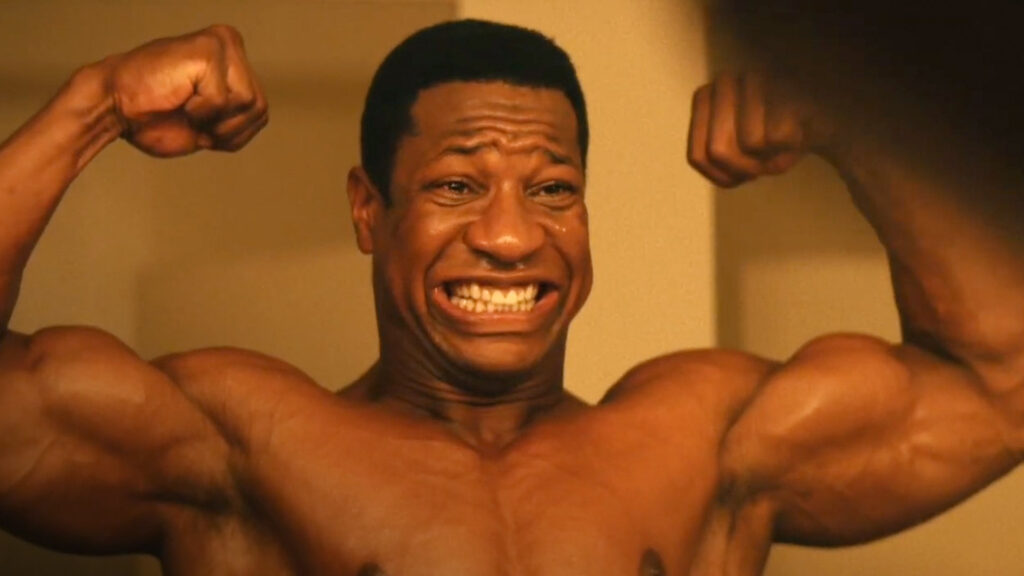
The opening shot of Magazine Dreams bathes its star in glowing, golden light. The camera looks upward from a low angle, allowing us to gawk appreciatively at its subject as he strikes a pose emphasizing his rippling musculature. The insinuation is that this Adonis has won some sort of award or, as implied by the title, graced the cover of a periodical. It’s the visual language of fantasy, an imagined triumph for both the movie’s troubled protagonist and its troubling star.
Magazine Dreams was supposed to be Jonathan Majors’ coronation. It premiered at the Sundance Film Festival in January 2023 (it received a special jury prize for “creative vision”), after which Searchlight won a bidding war and slated its release for that December—prime awards-season real estate. Majors, who had previously earned acclaim for his nimble turns in critical hits like The Last Black Man in San Francisco, Da 5 Bloods, and Devotion (plus HBO’s Lovecraft Country), was entering the mainstream. That March, he played the antagonist in Creed III (for which he made my Oscar ballot, as he did for Devotion); the month prior, he appeared as the villain in Ant-Man and the Wasp: Quantumania, and the dynastic plotters of the Marvel Cinematic Universe planned for his character, Kang, to serve as its big bad in future installments opposite The Avengers. Magazine Dreams—in which Majors delivers an intense, bruising performance as an unhinged bodybuilder, and which he reportedly prepped for by eating over 6,000 calories a day—represented his logical gateway to four-quadrant stardom.
That didn’t happen. Instead, what followed is a dispiritingly familiar saga that also provokes thorny questions about how real life influences the way we absorb cinema. In March 2023, police arrested Majors for assaulting his ex-girlfriend. He stood trial that December; he was acquitted of one assault charge and aggravated harassment, but he was convicted of misdemeanor assault and a harassment violation. (He was sentenced to probation and a yearlong counseling program, which he’s due to complete this month.) Thereafter, Marvel altered the trajectory of its upcoming Avengers sequels—a seismic shift in the blockbuster landscape akin to a glacier changing the direction of its runoff—and eliminated Kang (and Majors) from its field of vision. As for Magazine Dreams, Disney (Searchlight’s parent company) yanked it from the release schedule; it was eventually reacquired by indie distributor Briarcliff, who plopped it into theaters last month with no visible marketing effort. It played on over 800 screens but scraped up just $701k.

I was one of the few ticket buyers that weekend (precisely one other patron attended my multiplex showing), and that alone warrants an explanation, if not a defense. But let’s be clear: Nobody’s freedom has been curtailed here. Majors, as an actor seeking to pursue his chosen vocation, is free to continue working in motion pictures and to attempt to rehabilitate his image. Marvel and other studios are free to decline to employ him, whether that refusal stems from a lofty moral compass or a cruder concern for their bottom line. And audiences are free to exercise their market power and choose to see the movies he headlines, or not.
All of this strikes me as undisputed. (Remember that vague invocations of “cancel culture” tend to ignore the details of individual cases, instead pining for a world where actions are untethered from consequences.) What’s trickier is how to respond to Majors’ latest appearance while armed with this knowledge. The adage is that critics should separate the art from the artist, but I’m not sure that’s always true. In the case of Magazine Dreams and Jonathan Majors, I don’t know that it’s even possible.
The second feature from writer-director Elijah Bynum, the movie is tonally and structurally familiar. Majors plays Killian Maddox, a grocery store clerk and amateur bodybuilder who’s obsessed with achieving recognition for his physique. In one sense, he’s a decent and soft-spoken guy, caring for his ailing grandfather (Harrison Page) and silently nursing a crush on a coworker (Haley Bennett). He is also a loner and a fanatic, constantly pumping steroids into his veins and writing unanswered letters to his idol. He records YouTube tutorials describing his regimen, only his faltering speech patterns and clenched demeanor throttle any semblance of magnetism; the typical online comment to one of his videos reads, “How has this guy not killed himself yet?”

If that isn’t exactly a fair question, it does speak to the misery that pervades Killian’s existence. In terms of plot, Magazine Dreams proceeds as a continuous descent, with Killian succumbing to his darkest impulses as his miasma of despair threatens to explode into a storm of vengeance and criminality. (What initially appears to be a sliver of light—a dinner date he goes on with that aforementioned colleague, who appears to genuinely like him—gets quickly snuffed out when he terrifies her with an impulsive rant.) The film’s putative suspense derives not from speculating if he’ll be able to reverse his tailspin, but from wondering just how much damage he’ll inflict on his way down.
This is, all told, quite unpleasant. As a narrative of anguish and toxicity, Magazine Dreams is unremarkable. What makes the movie interesting—what gives it a queasy but undeniable kick—is Majors’ performance. The physical transformation is extraordinary; he’s always been a well-built guy, but Killian, with his swollen pecs and bulging biceps, really does look like a Mr. Olympia contender. Yet the more arresting facet of Majors’ work is how Killian’s imposing presence contrasts with his diffident, clumsy persona. He’s a mighty specimen and a total loser, and that combination is what makes him so frightening—a ticking time bomb persistently on the verge of detonation.
It’s a terrific piece of acting—at least I think it is. Watching Majors embody such a volatile and violent figure on film, I felt a flicker of disquiet and hesitation. Was this gifted and charismatic performer disappearing into the role of a hulking lunatic, or was he drawing on the latent, brutal tendencies that manifested so horribly in that real-life assault? Actors routinely exploit their own experiences in their craft—some critics (wrongly) impugned Kieran Culkin’s recent Oscar win for A Real Pain as the product of him just playing himself—but it’s decidedly less appetizing when those experiences involve inflicting trauma and bloodshed.

To be clear, I’m not suggesting any sort of causal relationship between Majors’ performance in Magazine Dreams and his actual crime. Acting, by its nature, is a technique of make-believe; a person pretends to be someone they’re not. What happened here isn’t that life imitated art, or vice-versa. It’s that the movie has somehow been infected by what took place beyond the boundaries of the screen.
Qualitatively, this shouldn’t make Magazine Dreams any better or worse, and ultimately I don’t think it really affected my critical opinion. But it’s hard to say for sure. In the movie’s most chilling scene, Killian invades the home of a bodybuilding judge who evaluated him at a past competition and disparaged the size of his deltoids. Killian humiliates the small and trembling man, forcing him to strike the same sequence of poses while mocking his limp, flabby form. It’s an assertion of power and an act of retribution, as Killian transfigures himself (in his eyes) from feeble sufferer to righteous avenger.
Scary stuff, and sad as well. But beyond its putative catharsis, the sequence supplies a different kind of meta sorrow, as we recognize that Majors’ ex-girlfriend can never take such extralegal action. That’s how a functioning society works; we need victims of abusers to rely on the court system, rather than administering their own frontier justice. Yet this dissonance somehow makes the movie feel both more absurd and more disturbing; it’s a patently fictional production that hits closer to home. Maybe we can separate art from artist, but it’s harder to disentangle magazine dreams from tabloid reality.
Jeremy Beck is the editor-in-chief of MovieManifesto. He watches more movies and television than he probably should.
